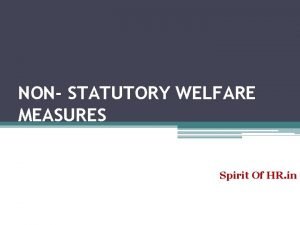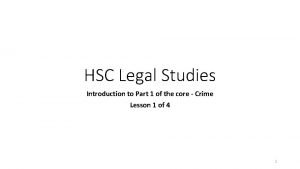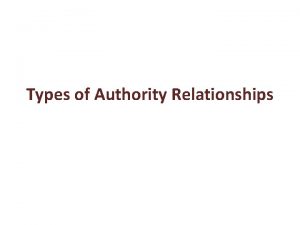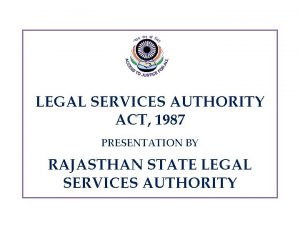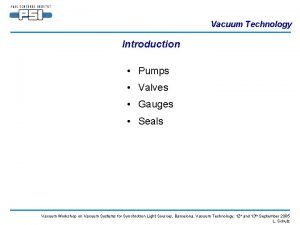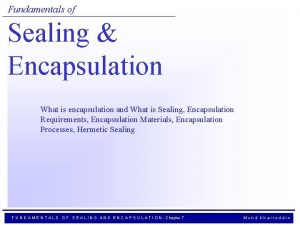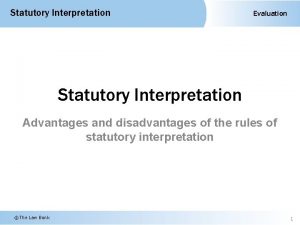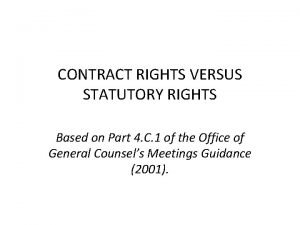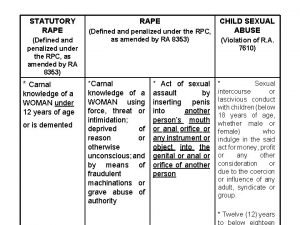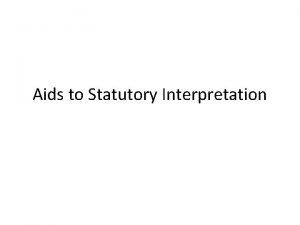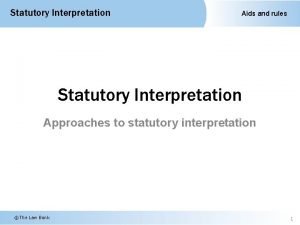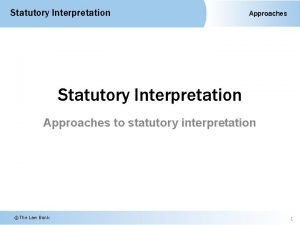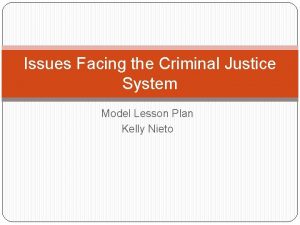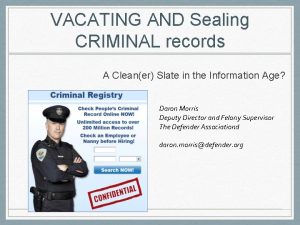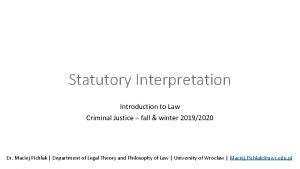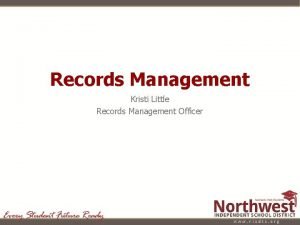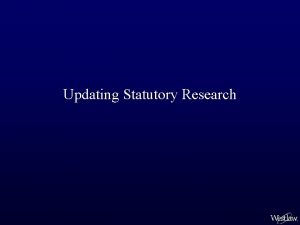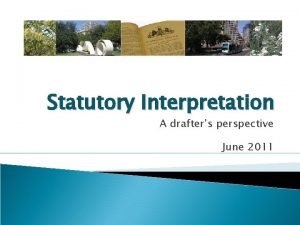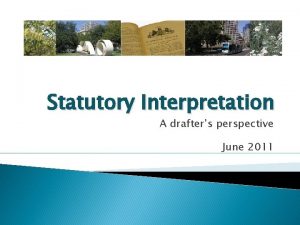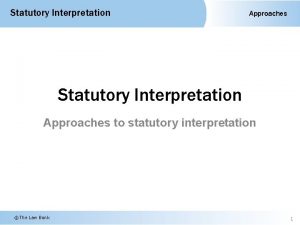SEALING CRIMINAL RECORDS Fall 2017 LEGAL AUTHORITY Statutory















































- Slides: 47

SEALING CRIMINAL RECORDS Fall 2017

LEGAL AUTHORITY • Statutory • Nevada Revised Statutes 179. 245 through 179. 301 • NRS 179. 245 pertains to sealing records after a conviction • NRS 179. 255 pertains to sealing records after a dismissal or acquittal

CATEGORIES OF CRIMINAL DEFENDANTS FOR PURPOSES OF SEALING • 3 primary groups of individuals • Privileged to apply- qualify due to meeting the charges and timing requirements • Not yet privileged to apply – timing or other requirements not met • Not eligible due to nature of their charges; until the law changes these individuals’ records cannot be sealed.

WHO ARE NOT ELIGIBLE TO HAVE RECORDS SEALED? Those who have been convicted of: • Crimes Against Children Any of the following offenses, or attempted offense if the victim of the offense was less than 18 years of age when the offense was committed: • Kidnapping - unless the offender is the parent or guardian of the victim. • False imprisonment - unless parent or guardian of the victim. • Involuntary servitude of a child -unless parent or guardian of the victim. • Sex trafficking or prostitution there were some changes to this in AB 243… • Felony DUIs • The whole spectrum of felony DUIs including boating DUIs

WHO ARE NOT ELIGIBLE TO HAVE RECORDS SEALED? • Sexual Offenses (including attempts to commit) • First Degree Murder committed in the perpetration or attempted perpetration of sexual assault or of sexual abuse or sexual molestation of a child less than 14 years of age • Sexual assault • Statutory sexual seduction, if punishable as a felony. • Battery with intent to commit sexual assault • An offense involving the administration of a drug or controlled substance to another person with the intent to enable or assist the commission of a felony, if the felony is an offense listed in this paragraph. • Abuse of a child, if the abuse involved sexual abuse or sexual exploitation. • An offense involving pornography and a minor • Incest • Open or gross lewdness, if punishable as a felony. • Indecent or obscene, if punishable as a felony. • Lewdness with a child • Sexual penetration of a dead human body • Sexual conduct between certain employees of a school or volunteers at a school and a pupil • Sexual conduct between certain employees of a college or university and a student • Luring a child or a person with mental illness, if punishable as a felony.

WHO ARE NOT ELIGIBLE TO HAVE RECORDS SEALED? • Petitioner has pending and/or active cases or warrants • Case was dismissed without prejudice – must wait until the statute of limitations has run • The statute of limitations for uncharged offenses has not run • Those who were dishonorably discharged from probation NRS 176 A. 870 AMENDED IN 2017

WHO IS ELIGIBLE TO PETITION TO SEAL RECORDS? • Those who by law are granted the privilege and have met the timing requirements • Not a guarantee that the Court will seal these… however, in AB 327, the Legislature declared that the public policy of the State is to favor the giving of second chances to offenders who are rehabilitated and sealing of their records. • There is now a rebuttable presumption that the record SHOULD be sealed if the applicant meets the statutory requirements for sealing of the records • Unless the petitioner was dishonorably discharged from probation then, no rebuttable presumption.

FOUR DIFFERENT CATEGORIES OF SEALING • Acquittal • Dismissal • Prosecution declined • Conviction

ACQUITTAL NRS 179. 255(1)(c) • Went to trial and were found not guilty • Can be sealed at any time after the acquittal was entered

DISMISSAL NRS 179. 255(1)(a) • Charges were filed but for some reason, the State dismisses them • Can be sealed at any time after the charges were dismissed

PROSECUTION DECLINED NRS 179. 255(1)(b) • The person was arrested but for some reason the State declined to prosecute the offense(s) • Charges can be sealed: • Any time after the applicable statute of limitations has run; • Any time 10 8 years after the arrest; or AMENDED by AB 327 • Pursuant to a stipulation between the parties

CONVICTIONS NRS 179. 245 • Whether by plea or as a result of a trial a guilty or nolo contendere (no contest) plea was entered • Must comply with the statutory time requirements

TIMING REQUIREMENTS Charges D • Eligibility is based in part upon a waiting period N E • PRE- LEGISLATIVE CHANGES M A Category A or B felony D E Required Waiting Period 15 years Category C or D felony 12 years Category E felony 7 years Enhanceable misdemeanors (non-felony DUI, non-felony domestic battery) 7 years Gross misdemeanors 7 years All other misdemeanors Acquitted/Dismissed charges W S A 2 years No wait, unless dismissed w/o prejudice *from the date of release from custody or discharge from parole or probation, whichever occurs later

2017 TIME REQUIREMENTS SB 125; Amended NRS 179. 245 Charges AMENDED Required Waiting Period Category A, a crime of violence, or a burglary of a residence 10 years Category B, C, or D felony 5 years Category E felony 2 years Gross misdemeanors 2 years Enhanceable misdemeanors (non-felony DUI, non-felony domestic battery) 7 years Battery, stalking, violation of a temporary or extended protection order against harassment or stalking 2 years All other misdemeanors 1 year Acquitted/Dismissed charges No wait, unless dismissed w/o prejudice ** from the date of release from custody or discharge from custody, suspended sentence, parole or probation, whichever occurs later

DEFINITIONS • Crime of violence- means any felony for which there is a substantial risk that force or violence may be used against the person or property of another in the commission of the felony. • Harassment- NRS 200. 571 - Without lawful authority, the person knowingly threatens: • To cause bodily injury in the future to the person threatened or to any other person; • To cause physical damage to the property of another person; • To subject the person threatened or any other person to physical confinement or restraint; or • To do any act which is intended to substantially harm the person threatened or any other person with respect to his or her physical or mental health or safety; and • The person by words or conduct places the person receiving the threat in reasonable fear that the threat will be carried out.

DEFINITIONS • Residence- any house, room, apartment, tenement or other building, vehicle trailer, semitrailer, house trailer or boat designated for occupancy as a residence. • Stalking- A person who, without lawful authority, willfully or maliciously engages in a course of conduct that would cause a reasonable person to feel terrorized, frightened, intimidated, harassed or fearful for the immediate safety of a family or household member, and that actually causes the victim to feel terrorized, frightened, intimidated, harassed or fearful for the immediate safety of a family or household member, commits the crime of stalking.

LEGISLATIVE CHANGE MARIJUANA CONVICTIONS AB 259 • APPLIES ONLY IF THE OFFENSES ARE NOW LEGAL • If petitioner was convicted of misdemeanor marijuana for the possession of less than 1 ounce or less of mj, petitioner may file to have the record(s) sealed and the Court SHALL vacate the judgement and seal the records • If petitioner was convicted of other offenses involving marijuana under NRS 453. 336(4) (remember some of these became gross misdemeanors based on enhancements) the Court MAY vacate the judgement but the Petitioner has to notice the District Attorney’s Office and the District Attorney’s Office MUST be allowed to testify and present evidence • This Bill also allows for some deficiencies (such as time requirements) , the Court may still vacate the judgement and seal the records • If the petitioner would have to file more than one petition and would have to file a petition in more than one court, they can now file 1 petition in the District Court • The State must be noticed every time • These convictions must still comply with the mandates of NRS 179. 245 • Which should include waiting 1 year prior to sealing

LEGISLATIVE CHANGE PROSTITITION/VICTIMS OF HUMAN TRAFFICKING/INVOLUNTARY SERVITUDE AB 243 • If the petitioner has been convicted of: • Engaging in prostitution or solicitation for prostitution, • Unlawful trespass, • Loitering or someone who permitted a person to loiter, in or about any room or premises wherein any licensed game, race book, sports pool or pari-mutuel wagering is operated or conducted, • Or a county, city, town ordinance for loitering for the purpose of solicitation or prostitution • AND • The conviction was due to participation as a result of the petitioner being a victim of Human Trafficking, Involuntary Servitude

PROSTITUTION/VICTIMS OF HUMAN TRAFFICKING/INVOLUNTARY SERVITUDE AB 243 • Time requirements: Petitioner may file to seal after “the petitioner has ceased being a victim of trafficking or involuntary servitude, or has sought services for victims of such trafficking or involuntary servitude. ” • Traditional time requirements do not have to be met; must wait one year to file the petition. • Before granted, the Court SHALL: • Notify the AG’s Office, each District Attorney and law enforcement agency in the State and allow any person to testify and present evidence on behalf of such entity. • Take into consideration reasonable concerns for the safety of the Petitioner and Petitioner’s family members. • If the Court grants: • The judgement is vacated and the paperwork is sealed. • Court may otherwise also seal, even if the petition is deficient. • May file 1 petition in District Court if would have to file in multiple courts.

PRE 2017 LEGISLATURE CHANGES PRIOR LAW FOR DISHONORABLE DICHARGEEES NRS 176 A. 870 Dishonorable discharge. A defendant whose term of probation has expired and: 1. Whose whereabouts are unknown; 2. Who has failed to make restitution in full as ordered by the court, without a verified showing of economic hardship; or 3. Who has otherwise failed to qualify for an honorable discharge, is not eligible for an honorable discharge and must be given a dishonorable discharge. A dishonorable discharge releases the probationer from any further obligation, except a civil liability arising on the date of discharge for any unpaid restitution … but does not entitle the probationer to any privilege conferred by NRS 176 A. 850

A LOOK AT 176 A. 850 A person who has done well on probation and is recommended for early discharge by the division or who has demonstrated fitness for honorable discharge but not financially been able to pay restitution may be granted an honorable discharge from probation by order of the court. A person who has been honorably discharged from probation (unless they fall within section 4): • Immediately restored to the following civil rights to vote and serve as a juror in a civil action. • Four years after the date of honorable discharge: is restored to the right to hold office. • Six years after the date of honorable discharge: is restored to the right to serve as a juror in a criminal action. • If the person meets the timing requirements they may apply to the court for the sealing of records relating to the conviction. • Does not have to register as an ex-felon unless they are now a sex offender • Still have to disclose the conviction to a gaming establishment and to the State and its agencies, departments, boards, commissions and political subdivisions, if required in an application for employment, license or other permit, but does not otherwise need to disclose the conviction to their employer or prospective employer.

4. Except as otherwise provided in this subsection, the civil rights are not restored to a person honorably discharged from probation if the person has previously been convicted in this State: (a) Of a category A felony. (b) Of an offense that would constitute a category A felony if committed as of the date of the honorable discharge from probation. (c) Of a category B felony involving the use of force or violence that resulted in substantial bodily harm to the victim. (d) Of an offense involving the use of force or violence that resulted in substantial bodily harm to the victim and that would constitute a category B felony if committed as of the date of honorable discharge from probation. (e) Two or more times of a felony, unless a felony for which the person has been convicted arose out of the same act, transaction or occurrence as another felony, in which case the convictions for those felonies shall be deemed to constitute a single conviction for the purposes of this paragraph. A person described in this subsection may petition a court of competent jurisdiction for an order granting the restoration of civil rights as set forth in subsection 3. 5. The prior conviction of a person who has been honorably discharged from probation may be used for purposes of impeachment. In any subsequent prosecution of the person, the prior conviction may be pleaded and proved if otherwise admissible.

LEGISLATIVE CHANGE AB 327 AMENDED 176 A. 870 DISHONORABLE DISCHARGEES NOW ELIGIBLE • A defendant who was dishonorably discharged from probation, may NOW, upon the appropriate time requirement passing, apply to the court to seal the records relating to the conviction. THIS IS A CHANGE • They are still not be eligible for the privileges of 176 A. 850 • Which are the restoration of civil rights at the following timeframes: • Immediately: The right to vote and the right to serve as a juror in a civil action. • Four years after the date of honorable discharge: the right to hold office. • Six years after the date of honorable discharge: the right to serve as a juror in a criminal action. • Does have to register as an ex-felon unless they are a sex offender • Still have to disclose the conviction to a gaming establishment and to the State and its agencies, departments, boards, commissions and political subdivisions, if required in an application for employment, license or other permit, but does not otherwise need to disclose the conviction to their employer or prospective employer. • If more than one conviction and would otherwise need to file a petition on more than one court, they may not file a single petition in District Court to seal all of records.

DISHONORABLE VS REVOKED • Defendants who have been given a dishonorable discharge from probation are now eligible to file a petition to seal • Defendants who have had their probation revoked (sent to prison) are not eligible

WHAT A SEALED RECORD MEANS • Sealing a record is not the same thing as expungement • Nevada does not have expungements • An order sealing records does not allow for the destruction of the records themselves. It simply removes the records from general information sources. • In fact, they can be used later….

RENOPENING RECORDS NRS 179. 295 • The petitioner may petition the court that ordered the records sealed to permit inspection of the records by a person named in the petition. • If a person has been arrested, the charges have been dismissed and the records of the arrest have been sealed, the court may order the inspection of the records by a prosecuting attorney upon a showing that as a result of newly discovered evidence, the person has been arrested for the same or a similar offense and that there is sufficient evidence reasonably to conclude that the person will stand trial for the offense. • The court may, upon the application of a prosecuting attorney or an attorney representing a defendant in a criminal action, order an inspection of such records for the purpose of obtaining information relating to persons who were involved in the incident recorded. • This section does not prohibit a court from considering a conviction for which records have been sealed in determining whether to grant a petition to deal or grant diversion.

INSPECTION OF RECORDS NRS 179. 301 • This means they can be inspected by: • • Petitioner Prosecuting attorney An attorney representing a defendant in a criminal action Gaming Control, if gaming related Division of Insurance, if insurance related Central Repository if sexual offenses Board of Pardons Commissioners • The Court may consider sealed records in making a decision for sealing, diversion or probation

PROCESS GENERALLY FOR PETITIONER • Phase 1 - Gather Information • The first step in having a record sealed involves obtaining a verified criminal history • Phase 2 - Making lists/drafting/filling in forms • The next step is to put together a package that contains the arrests/convictions the petitioner would like to be sealed, the date of each arrest, the name of the police department arrested by, the result of each arrest whether the petitioner was convicted, acquitted, or had the charges dismissed. • Phase 3 - Prepare and file forms • If your jurisdiction has a process to submit the Petition/Order via stipulation that occurs here. • If your jurisdiction does not have a process to submit via stipulation the paperwork is filed with the appropriate Court here. • Phase 4 - Notify agencies of Court Order sealing records

PHASE 1 – GATHER INFORMATION • In this phase the petitioner gathers information and documentation • Step 1 - request and receive the statewide Criminal History Record “CHR” • Step 2 - request and receive copies of their criminal history from at least one police department “SCOPE” • Step 3 - collect other potentially essential documentation • Such as if they were discharged from probation, the discharge paperwork must be attached to the petition

CHR • A CHR is a criminal history for the state of Nevada • To apply for this the petitioner must: • Fill out the form • Get fingerprinted • Pay a fee and submit the above • This is the first thing the petitioner should apply for because it can take 6 -8 weeks to process • Only good for 30 days

FORM

Fingerprint card • Petitioner must get their fingerprints taken by a certified fingerprint technician on a standard fingerprint card

PAY A FEE AND SUBMIT FORMS • Fee is $23. 50 via MONEY ORDER OR CERTIFIED CHECK • Paid to the Department of Public Safety • Staple together the form, fingerprint card, and the fee payment and send all in an envelope to: Department of Public Safety Records and Technology Bureau Attn: Fingerprint Support Unit 333 West Nye Lane, Suite 100 Carson City, Nevada 89706 • This will then get processed in 6 -8 weeks

SCOPE • The SCOPE is the report of criminal history with a specific police department. • Petitioner should get a SCOPE for each police department that arrested Petitioner. • The Scope is no longer required but it is advisable to obtain one so the Petitioner knows the correct charge, the charge described specifically and the correct date.

SUPPORTING DOCUMENTATION • If the petitioner was convicted of a gross misdemeanor and a felony they must obtain copies of their judgement of convictions. • If the petitioner was on probation or parole they need a copy of their discharge paperwork from Nevada Division of Parole and Probation

PHASE 2 - MAKING LISTS/DRAFTING/ FILLING IN FORMS • Lists- Petitioner must make a list of all criminal history organized by court (This is why the SCOPE is important). Separating each District Court from lower court on a blank paper or spreadsheet • List should include: • • • Date of Arresting Agency Charge Case Number Outcome/Disposition

FILL OUT LEGAL FORMS • For each list made the following forms must be filled out and submitted: • • • Petition to Seal Records Order to Seal Records Declaration from Petitioner Notice of Entry of Order Certificate of Mailing

PHASE 3 - PREPARE AND FILE FORMS WITH THE APPROPRIATE ENTITY • The process is the same for Justice Courts and District Courts • The process is different for Municipal Courts • Requires the filing of an extra form/extra copy

WHERE ARE PETITIONS FILED? • The petition is filed in the Court where the charges were filed • District Court • Justice Court • Municipal Court • LEGISLATIVE CHANGE • AB 327 permits those individuals filing under NRS 179. 245, 179. 255, or 179. 259 (standard petitions) to file in JUST THE DISTRICT COURT if they would have to file in more than one court • Gives the District Court authority to order Justice Court and Municipal court files sealed

FILE THE PAPERWORK AND COPIES • Petition • 4 things must be in place for a petition to be successful: • • The conviction must not be one that is prohibited Time requirements must have passed Verified criminal records have been obtained Petitioner must not have any pending charges or a conviction of any offense except minor traffic between the date of release and the hearing date. NRS 179. 245(4) • Order • Declaration • Copy of CHR • Copy any supporting documents

PHASE 4 - NOTIFYING AGENCIES OF ORDER TO SEAL RECORDS • Gist of this phase is to: • Sign forms • Mail the signed Order to various places, and • File some documents at the courthouse

PREPARE NOTICE OF ENTY OF ORDER AND CERTIFICATE OF MAILING • Once the Judge signs the Order to Seal Records, the petitioner must sign the Notice of Entry of Order and the Certificate of Mailing • For District Courts and Justice Courts and District Attorney or City Attorney send: • A certified copy of the Order to Seal Records • A copy of the Notice of Entry of Order to Seal Records, and • A copy of the Certificate of Mailing • For all other agencies: • A copy of the Notice • A copy of the Certificate of Mailing, and • A copy of the Certified Copy of the Order

NOTIFY AGENCIES • File Notice of Clerk of Court • For JUSTICE AND DISTRICT COURTS ONLY; this step is skipped for municipal court filings • This notice includes: • Original Notice of Entry of Order • Original Certificate of Mailing, and • Certified Copy of Order

OTHER LEGISLATIVE CHANGES • AB 327 - if the State stipulates to the filing of the records, the Court is no longer MANDATED to have a hearing • If the State does not stipulate to the Petition the Court MUST hold a hearing • AB 327 - If the person wishes to have more than one record sealed and would otherwise need to file a petition in more than one court for the sealing of the records, the person may file a petition in District Court for the sealing of all records

MISCELLANEOUS INFORMATION • Sealing does restore some civil rights (NRS 179. 285(1)(a)) • Voting • Juror • Hold an office • NOT GUN RIGHTS; such requires a pardon (NRS 179. 285) • Sealing of records does not extend to or permit the sealing of Department of Motor Vehicle records • If a petition is denied under NRS 179. 265(1) a person may not petition for a rehearing any sooner than 2 years after the denial • Limited to 2 rehearing petitions • This process generally takes a petitioner 6 -12 months

COMMON MISTAKES MADE WHEN FILING • Not serving the District Attorney’s Office • Not sending a complete packet to the District Attorney’s Office • Not filling in the forms/not including the requisite information • Filing too soon/not complying with the statutory timing requirements • Filing a petition for domestic battery/dui • Not describing the individual arrests and subsequent record completely in the Petition and Order.

QUESTIONS?
 Statutory and non statutory welfare measures
Statutory and non statutory welfare measures Factors affecting criminal behaviour legal studies
Factors affecting criminal behaviour legal studies Line authority
Line authority Are medical records legal documents
Are medical records legal documents Importance of lok adalat
Importance of lok adalat Ultrasonic seam sealing machine
Ultrasonic seam sealing machine Telecommunication sealing technology
Telecommunication sealing technology Homophone for quay
Homophone for quay Telecommunication sealing technology
Telecommunication sealing technology Furmanite flange clamp
Furmanite flange clamp Telecommunication sealing technology
Telecommunication sealing technology Sealing zone osteoclast
Sealing zone osteoclast Furmanite leak sealing
Furmanite leak sealing Pump of the volume
Pump of the volume Sealing ic package
Sealing ic package Capless seal
Capless seal Njdv
Njdv Non banking statutory financial organization
Non banking statutory financial organization Statutory relationship
Statutory relationship Statutory interpretation exam questions
Statutory interpretation exam questions Statutory interpretation outline
Statutory interpretation outline Independent maori statutory board
Independent maori statutory board Aids to statutory interpretation
Aids to statutory interpretation National curriculum core subjects
National curriculum core subjects Statutory meeting
Statutory meeting Statutory rse
Statutory rse Advantages of golden rule of interpretation
Advantages of golden rule of interpretation Statutory rights example
Statutory rights example Veterinary statutory body
Veterinary statutory body What is statutory bonus
What is statutory bonus Statutory rape rpc
Statutory rape rpc Hire purchase is governed by
Hire purchase is governed by Intrinsic aids
Intrinsic aids Statutory principles of the mca
Statutory principles of the mca Statutory law
Statutory law R v harris (1836) 7 c & p 446
R v harris (1836) 7 c & p 446 Halimbawa ng karapatang mabuhay
Halimbawa ng karapatang mabuhay Broad approach golden rule
Broad approach golden rule Sompc
Sompc Mental capacity assessment example
Mental capacity assessment example Jmu criminal justice minor
Jmu criminal justice minor Eighth amendment excessive bail
Eighth amendment excessive bail Principios de la investigacion criminal
Principios de la investigacion criminal Difference between civil and criminal law table
Difference between civil and criminal law table History of criminal psychology
History of criminal psychology Que es la criminologia
Que es la criminologia Guelph criminal justice and public policy
Guelph criminal justice and public policy Biology and crime
Biology and crime
